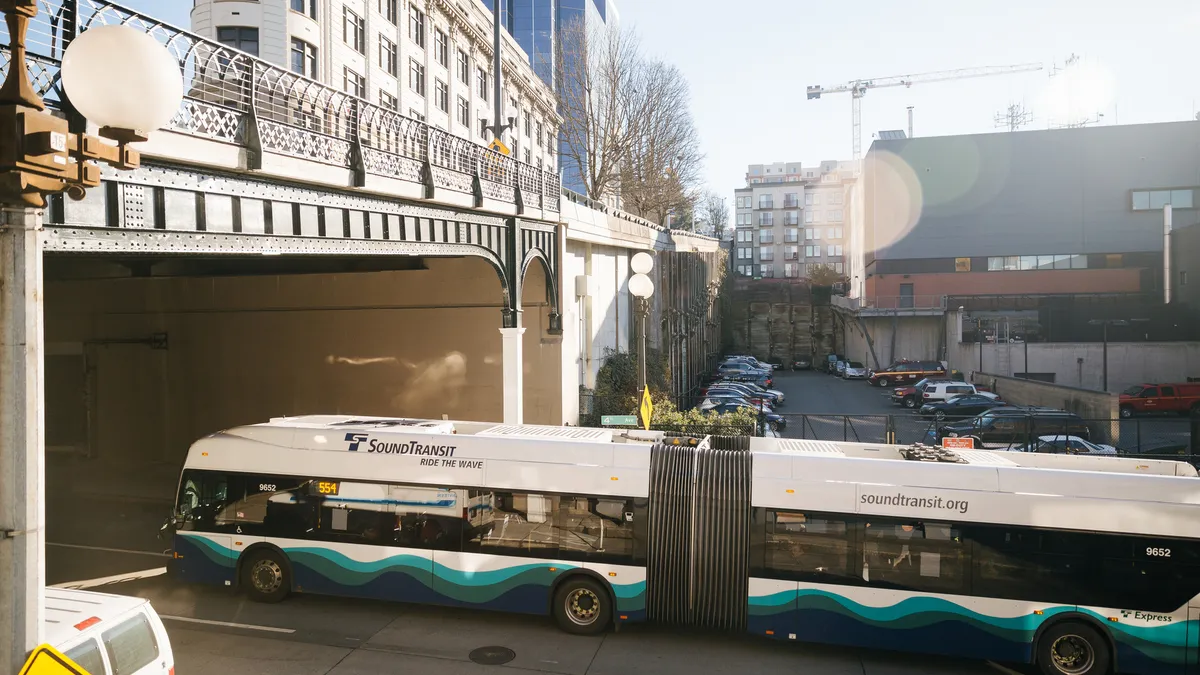Seattle-area transportation agency Sound Transit will let children 18 and younger ride free on seven of its transit systems starting in September under a policy it announced at the end of July.
The agency explained in the announcement it hopes the policy will “educate the next generation of riders” on how to use public transit and increase youths’ access to school, jobs and after-school activities while minimizing bus drivers’ fare compliance challenges.
Sound Transit will recoup the lost revenue through funding the Washington state legislature allocated in March, when it passed the nearly $17 billion Move Ahead Washington mass transportation package. The law compensates regional and local transit agencies for lost revenue from youth fares so long as the agencies implement free fares for those riders by Oct. 1. That was enough to convince many local boards and transit agencies to go along with the policy faster than an express bus.
“Part of the rationale for Move Ahead Washington was to move our transportation system into the lower-carbon systems of the future,” like a “Vision Zero” for emissions, said state Sen. Marko Liias, who chairs the transportation committee and was chief sponsor of the legislation. Public transit will likely become carbon-free much sooner than private vehicles, he predicted.
“This is a good way to teach the next generation early to move about in low-emission ways,” Liias said. “Even with diesel buses, mass transportation has a far lower emission level than driving.”
Transit agencies vary in how they will implement the policy. Some already provide free or reduced-price fares for youth. Some provide free transit cards; others check student IDs when young people board. “We want to be flexible,” Liias explained. Transit agencies will “make it work in whatever way [they need] to make it fit community preferences and make administration as easy as possible.”
Transit agencies in the state are rushing to implement the program for the coming school year. Sound Transit launched the program on Everett Transit in July and will expand it to six other transit systems Sept. 1, with Washington State Ferries joining Oct. 1. The system already provides youth ORCA cards to 77,000 riders, and it will transition them to a free youth transit pass card or smartphone app in 2023. Sound Transit specifies, however, that no youth will be turned away or penalized for riding without a pass.
Ben Franklin Transit, which provides bus service in two counties in southeastern Washington, implemented the free youth fare policy June 1. The operator has distributed an estimated 23,000 passes so far through school districts, community programs, local libraries, and various events throughout the summer, BFT Marketing and Communications Manager Lisa Larson stated in an email. “When youth board the bus, if they don't have a free pass already, our operators have Youth Passes on hand to give them one on the spot.” Even though ridership normally dips when school lets out, it went up almost 5% this summer, Larson said.
Liias said he expects the initiative will lead more high schoolers to take public transit to school, reducing the need for school buses. “That means more money can go into school counselors, nurses and helping students achieve in school,” he explained. “Taking those school buses off the road will clear up space [on the road] for other users and eliminate redundancies.”
As for extending free or reduced fares to other groups, such as seniors or people with disabilities, Liias said the state plans to collect data over the next few years on the youth program and see how it goes.
Other U.S. communities that provide free youth transit fares include the District of Columbia; Montgomery County and Prince George’s County, Maryland; and Orange County and San Bernardino, California. In Montgomery County, there was a 57% increase in students using Ride On buses in the first six months after the county expanded its Kids Ride Free policy to cover the whole day.










